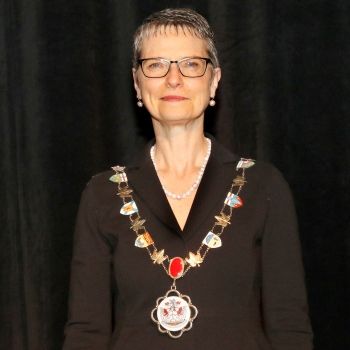
Janet M. Fuhrer, Law’85, has been preparing for the presidency of the Canadian Bar Association (CBA) since she was elected its Second Vice-President two years ago. This year, on Aug. 16, her ultimate role became official when she received the President’s chain of office at the end of the CBA Legal Conference in Calgary. Over the next year, she will lead the organization that represents 37,000 legal professionals and students nation-wide. In her new multi-faceted position with the CBA, she’ll be advocating for members’ interests within and outside Canada, presiding over meetings of the Executive Officers and Board of Directors, liaising with branches and other constituencies, serve as spokesperson, and provide leadership in many and varied activities.
Queen’s Law Reports interviewed the new President to learn more about her plans for the upcoming year.
QLR: What do you look forward to most as CBA President?
JF: I look forward to meeting and working with members in respect of several significant ongoing projects and promoting the benefits of membership to potential members.
QLR: What are your priorities for the CBA?
JF: We have three significant ongoing projects: Futures, Equal Justice and Rethink. The latter initiative involves an evaluation of everything we are doing at the CBA, why we do it, how we do it and what maybe we shouldn’t be doing. As the legal profession changes, so too does what the members want from our Association. With the Rethink project, the CBA is gaining a deep understanding of our members’ evolving needs. We want to grow with them and be their best ally and partner.
QLR: What are your plans for mentoring, and why is it a top priority?
JF: Mentoring fits well within these projects and plans include making mentoring part of the fabric of our Association and our interaction with members. According to an initial report from the Rethink initiative, too many lawyers feel isolated and alone. It’s a reason why I believe that mentoring is important for our profession.
Mentoring starts with helping young or new lawyers acclimate to the rigours of law practice, but it extends beyond that. It means helping one another through different stages of our careers. It means connecting with supportive individuals and using them as sounding boards for advice and encouragement. Knowing we are not alone, that we are part of a larger legal community, helps lawyers thrive and serve their clients effectively.
The CBA can and does make mentoring happen. As a membership-based organization, we are superbly equipped to help lawyers connect. I want to make sure the CBA works to create and nurture meaningful mentoring relationships.
QLR: What are you planning for women in the profession, and why is it important now?
JF: While we have made strides toward greater inclusion, particularly in law schools, more needs to be done to increase understanding of diversity, and what it means to be a diverse community – and why everyone benefits.
Having graduated from Queen’s Law 30 years ago, and being a proud Queen’s Law graduate, it’s difficult for me to believe that we are still talking about parity in the profession; yet we continue to do so. We all need to make more effort, through mentoring and other means, to achieve parity of women in the legal profession, in leadership roles in the profession, and to embrace diversity in general.
It makes perfect sense for the Canadian Bar Association to do this. The more diverse we are, the more we resemble our clients, and the better the client relationships we develop.
QLR: What is your goal for client relations, and why did you choose it as a priority?
JF: Law and the way we access information are changing, which affects the way we interact with clients. These days, lawyers need to do more than give options: We should give practical, strategic advice that will guide people and help resolve, and even prevent problems. When we provide options without giving guidance, we are not helping our clients.
We also must work strategically – in a way that builds trust. No longer can we assume that people will trust us and come to us simply because we are experts on the law.
QLR: What will be happening with the CBA’s major ongoing goals over the next year?
JF: With Equal Justice and Futures, landmark reports were produced in 2013 and 2014 respectively, and can be accessed online. There is still ongoing work resulting from those reports; recent examples include legal health checks and a toolkit for lawyers on preventive law to help people identify and deal with legal issues before they become full-fledged problems.
With Rethink, we will be entering critical decision-making and implementation stages in the next 6-12 months.
QLR: Is there anything else you would like to say to fellow alumni and other members of the CBA or to current law students?
Get involved. There are so many opportunities for building networks and communities which will endure throughout your career. Imagine the CBA as your indispensable partner to improve or to change competencies, to have a fulfilling career and to earn a sustainable livelihood, ultimately to better serve the public.
Janet Fuhrer, is a partner with Rideout & Maybee LLP in Ottawa and a member of the Dean’s Council at Queen’s Law. Earlier this year, she participated in a roundtable discussion with Professor Art Cockfield, Law’93, and three fellow alumni. Watch for the story “Law and Technology: How will on artificial intelligence will affect the legal profession over the next decade?” this fall in the 2015 issue of Queen’s Law Reports.